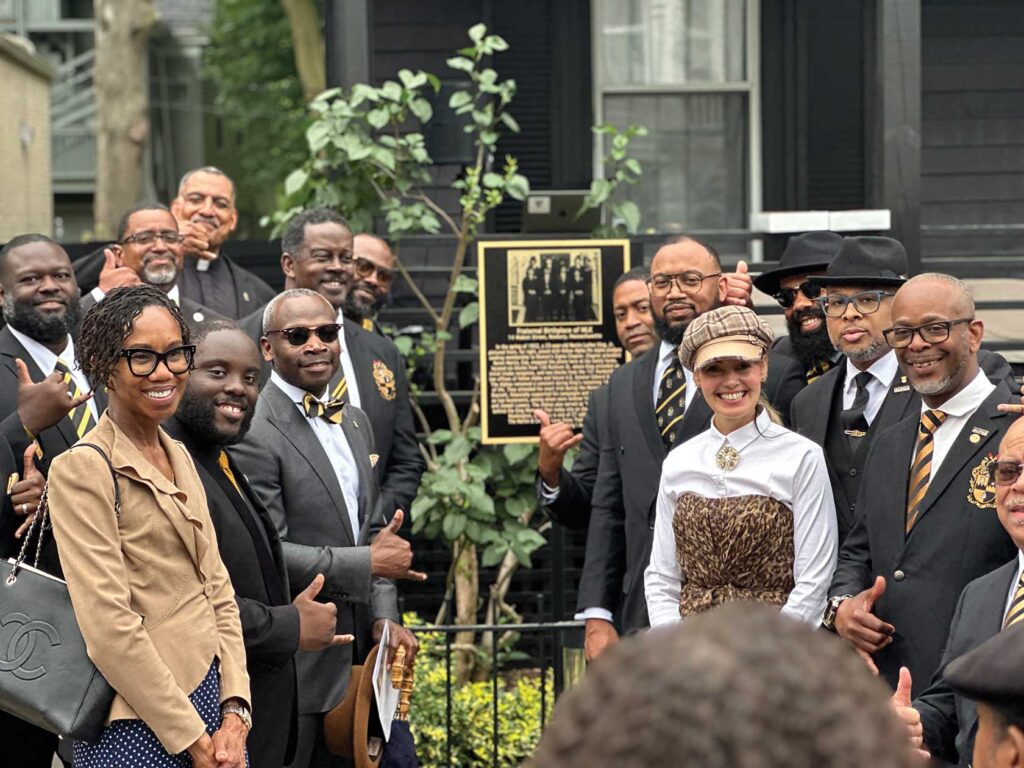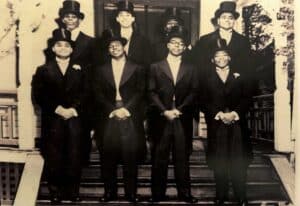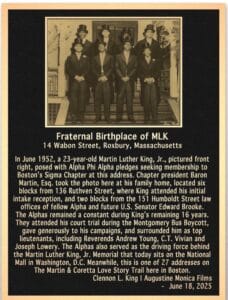
The daughters of two associates of Martin Luther King Jr. from his Boston years recently unveiled a plaque in Roxbury where he attained membership in the nation’s oldest Black collegiate fraternity, Alpha Phi Alpha.
Lauren B. Martin, an actress of New York City; and Myra I. Hemingway of Medford, senior and trial court clerk of Massachusetts, unveiled the plaque on June 18 at 14 Wabon St. in Roxbury, the original site of the photograph. June 18 was also the 72nd wedding anniversary of King and his wife, Coretta Scott King.

Members of the Alpha Phi Alpha Sigma chapter pose for photo in 1952. (Back Row) Herman Hemingway, Alfred Johnson, Harvey Washington, Starr Scott, (Front Row)
John Bustamonte, Kenneth Simmons, William Morris, Dr. Martin Luther King Jr. PHOTO: FAMILY OF BARON MARTIN
The plaque features an iconic 1952 photo of King and seven fraternity line brothers taken on the front steps of Lauren Martin’s family home. Her father was the late Roxbury and Wareham Judge Baron H. Martin II. He was also the Sigma Chapter president of Alpha Phi Alpha at the time.
The image captures eight pledges, including King, pictured bottom right, and Myra Hemingway’s father, the late attorney Herman W. Hemingway, at the top left. The following year, Hemingway would be the first of two Blacks to graduate from Brandeis University.
The plaque will be the fourth physical marker unveiled in the digitally based 27- address “Martin and Coretta Love Story Trail” in Boston, researched and designed by historian and documentary filmmaker Clennon L. King (no relation). The filmmaker lived in Greater Boston for nearly a decade and authored the granular Boston Magazine article on the couple’s Boston years.
Clennon talked about why it is important to mark history like this plaque and the Kings’ “Love Story Trail,” especially during this political climate where Black and brown history is being erased.
“It is especially important for our children to know that Dr. King went and mounted a protest in that neighborhood, in that very neighborhood. …This is where the story is, and if we don’t mark it, then it’s going to fall by the wayside. That’s why it’s so important. [It is] less about white people, more about our children, more about our descendants. We owe that to them. We owe it to the ancestors, and we owe it to the heirs,” he said.
Hemingway said this iconic photograph is a picture that had been in her family for a while, as her father was one of the line brothers with King of the Alpha Phi Alpha Fraternity, Inc., but only recently had it come to public light.
She talked about how important the plaque is for the city of Boston, especially for the Black community.
“People are actually recognizing what it represents. I think it’s really important for the city of Boston to be able to see this, this picture of history that’s preserved but has come to light now, especially in the Black community, where there’s such an extreme erasure of a lot of things and regression of Black history, Black struggles, and Black accomplishments in today’s society. It’s really important to still have a shining light on newly recognized pieces of history in Boston’s community … the bond that Dr. Martin Luther King had with his line brothers and with the city of Boston and the community, it just means so much for people in the pictures, the family, for the communities, the neighborhood,” she said.
“Just looking at the picture, it really epitomizes unity, brotherhood and Black excellence, something that really in the past, was revered in the Black community. We want to keep it alive. With so much happening now in today’s society … having a picture now that’s come to light in this time with what’s going on in the world and in this country, it’s important to see that there’s still hope that things are going to be okay,” she added.
Martin talked about what she hopes community members feel when they see the plaque.
“I think (it makes) you walk a little straighter when you walk by. I think (when) you see it, you say, ‘Okay, every person is capable of something, something important, something great.’ Even if it’s just a reminder to know that actions matter … that’s what we need to hear right now. …Our very democracy is something that we need to fight for right now … that simple reminder of when you look at the bright smile in that photograph, you look at the hopefulness that these young men had — it is a reminder that everybody has greatness within them, and I think it’s important, especially in this community right now, it’s important to remind ourselves,” she said.
Jason Asirifi, District II Director of the Organization of New England Chapters of Alpha Phi Alpha Fraternity-Eastern Region, said that the Alphas continue to stand in the gap for the community, just as their brother King did.
He said he hopes community members will realize King’s humanity when they see the plaque.
“I hope it helps people realize their own strength and potential. Because Brother King was human, just like the rest of us, and he accomplished so much. So each and every one of us who walk by that plaque are walking in the same footsteps that he walked in, and we, too, can live up to that same potential and make that same difference that he made,” he said.
Historian Joel Mackall of Boston spoke about how important it is to have historic markers, like this new plaque, in our communities.
“Even when we were doing [the unveiling ceremony]—that is an active street. While we’re doing the plaque unveiling and the ceremony and the speakers and the fraternity brothers, who are the descendants of fraternity brothers who were who pledged with him … we were being interrupted by the garbage truck, by the UPS guy, by just neighbors driving by and you could see them looking — asking themselves — ‘Well, what are these people doing? What’s this? Why is everybody on the porch? Why is everybody dressed up?’ You forget that from time to time, that you need to have these markers in this context, too,” he said.
Roxbury resident Lovely Hoffman, who sang during the plaque unveiling ceremony, said she was happy to be a part of this moment, as she is also a part of The Divine Nine, as a member of Delta Sigma Theta Sorority, Inc.
“To see that one of our Divine Nine brothers was initiated, right here in Boston. A lot of people don’t know that. He was [initiated] along with some other brothers, who also [were] all very important figures in the movement. …It’s really important for people to see how much of an influence Dr. King had over the history of Boston, and also to see his membership involvement in Alpha Phi Alpha,” she said.
Rev. Albert Whitaker of St. Mark Congregational Church said having a historical marker like the King plaque is important today as there are efforts to erase the history of the Black experience in America.
“It’s so important that there is a continuum of our history as Black people, specifically in Roxbury. I’m very proud to actually pastor through a church in Roxbury. I think the other connection here is the fact that Herman Hemingway, his family, actually went to St Mark at one time. This continuum of history, it’s really important … in terms of the richness of just understanding and appreciating our history.”







